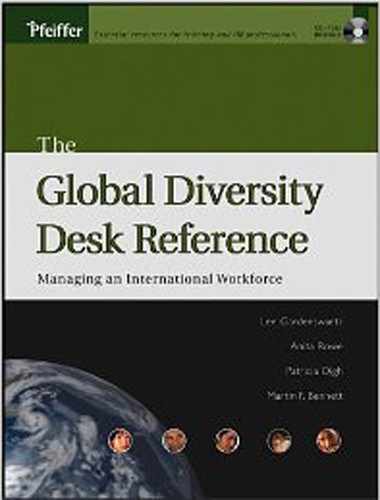7.4. DIVERSITY AND INTERNATIONAL ASSIGNMENTS
Global assignments are an important tool for establishing corporate inclusivity and supporting global diversity. They are also a key tool within the Global Diversity Capability Cycle.
A longstanding bias exists that cross-border employee exchanges should occur only at the most senior leadership or managerial levels. However, exchange at all levels is necessary to establish global diversity. Without such an exchange of nationals, it is unreasonable to imagine that any company will demonstrate global inclusiveness or reap its benefits.
Currently, most international exchanges have been for employees who manage term-limited projects, such as installing programs, accomplishing technology or corporate culture transfers, or serving as a financial link to headquarters. Global companies continue to struggle with creating a way to exchange employees at all levels. Driven by the economic constraints of the early 2000s, human resource professionals have restructured transborder employee mobility. They have created greater opportunities for short-term assignments, that is, assignments that range from one to six months. Greater interpersonal and cross-cultural damage can be done on this type of assignment because transferees do not have sufficient time to acculturate and learn appropriate behavior. Interviewing for short-term assignments demands rigor and a greater structure. Frequently, a sending manager, who has little contextual understanding of the receiving location, does the selection. Diversity performance outcomes should be tied to the sending and receiving managers' compensation to increase the likelihood that selected candidates will use the experience as a diversity learning opportunity. Short-term assignees usually receive no training or cultural briefing before departure. They are ill-prepared to either include themselves in their new work context or recognize the unique contributions their colleagues offer. They are rarely alerted to the fact that they are entering a different national context that requires personal behavioral change and diversity alertness. They will know, however, how to get to the office, the hotel, the restaurants, bargain locations for a gift for a family member, and where to go for entertainment if there is time—which there usually is. That level of cultural information is always exchanged. Short-timers do not recognize their range of assumptions about diversity forged from their home experience. Attitudes in the workplace toward race, gender, sexual orientation, ethnicity, nationality, religious orientation, and even toward work are usually carried unconsciously to new environments.
During the initial interview for a long-term or short-term assignment, diversity assignment objectives should be clearly communicated and documented. When professional or technical standards are outlined with clear outcome measures—that is, the operational goal of the assignment—global diversity goals should also be articulated. Goals that focus on inclusivity need to be a constitutive part of all selection processes. They need to be supported by the local and regional training staffs, as well as the sending and receiving managers. Global diversity objectives can be accomplished when employees are prepared for and held accountable to them. Basic goals for a short-term assignment (a two-to-six-month exchange) are
An increased knowledge of inclusivity and discrimination within the country of assignment and of the corporation's reconciling programs and policies;
An enhanced ability to establish and sustain a professional relationship with an employee of another national culture;
A proven ability to switch style when working with an employee with a nationally diverse background;
A mastery of basic greetings, polite phrases, and major proverbs and the use of unique cultural words in conversation;
An ability to communicate a personal reflection on issues such as gender, race, ethnicity, religion, and sexual orientation for a different and equally legitimate perspective; and
A willingness to share corporate process knowledge learned on assignment with colleagues when returned to the home country.
A structure to encourage reflection and learning is necessary. In expatriate and repatriation workshops, outgoing and homecoming employees can share lessons learned and co-coach. Globe Smart and Peer Notes, a tool being used by Rockwell, Guidant, and Kodak, is a web-based intranet application that allows employees on long-term and short-term assignments to share their perspectives of working in diverse work environments. This allows others to quickly learn what works and what does not.
Assignment assessment and selection systems must be restructured to highlight inclusivity. Most companies still maintain a corporate structure in which the staff responsible for diversity implementation is separate from the international selection and training staff. This is an unproductive disconnect. Without coordination of those two corporate functions and the conceptual expansion of diversity beyond gender, race, disability, and sexual orientation, companies will fail to leverage the broader dimensions of global diversity, that is, the interplay of national preferred business styles, the relevance of a multilingual work environment, and the cultural enhancements of organization building.
